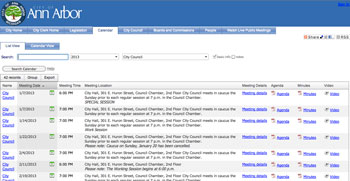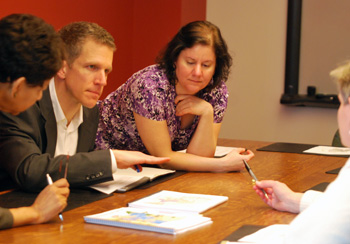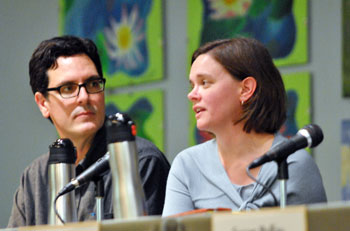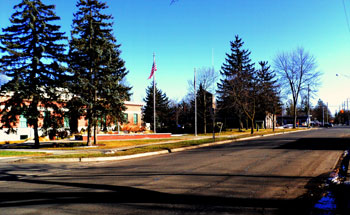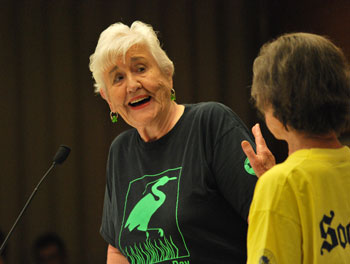April 7, 2014: Council Live Updates
Editor’s note: This “Live Updates” coverage of the Ann Arbor city council’s April 7, 2014 meeting includes all the material from an earlier preview article published last week. The intent is to facilitate easier navigation from the live updates section to background material already in this file.
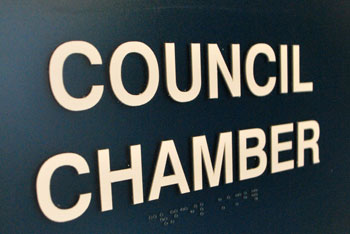
The sign on the door to the Ann Arbor city council chamber, installed in the summer of 2013, includes Braille.
The council’s April 7 agenda features two significant items of old business: a first reading of an ordinance that would regulate outdoor smoking in certain locations; and an allocation of funds for the work of a pedestrian safety and access task force.
The pedestrian safety task force funding resolution is now expected to be withdrawn. At the first meeting of the task force, held on Friday, April 4, Ward 1 councilmember Sabra Briere, speaking from the audience, told the group that it was her intent to withdraw the funding resolution when the council meets on April 7. Even if the resolution is withdrawn at the April 7 meeting, however, the task force will be able to continue its work.
Pedestrian issues form one of the themes of the meeting agenda – as the council will be approving annual contracts for the sidewalk repair program, as well as applying for a grant to renovate the pathway in Gallup Park – from the Geddes Dam at the east end of the Gallup Park pathway, to the parking lot east of Huron Parkway. Along with the sidewalk maintenance program contracts, the city council will also be asked to approve the annual street resurfacing program contracts.
Another main theme of the meeting is land use. Carried over as a topic from the council’s March 17 meeting is the surface of the city-owned Library Lane underground parking structure in downtown Ann Arbor. After voting on March 17 to hire a real estate broker, the council will consider a resolution on April 7 that would allocate to the city’s affordable housing trust fund half of the proceeds of any sale of the site’s development rights.
But on April 7, the council will also be considering an amendment to the March 17 resolution that directed the city administrator to list the surface of the Library Lane parking structure for sale. The amendment would require a public process to take place before brokerage services are obtained or the real estate is listed for sale. That public process is supposed to allow discussion of the possibility that the entire surface of the underground parking garage could be used as a park or plaza. The amendment is sponsored by Mike Anglin (Ward 5) and Jack Eaton (Ward 4).
The council will also be considering some items that arrived on its agenda via the city’s planning commission: rezoning of a nature area to PL (public land); and a resolution calling on the University of Michigan to incorporate the city’s land use recommendations as it considers the future use of the Edwards Brothers property on South State Street. The April 7 agenda also includes, as an item of communication, a resolution passed by the city planning commission on March 18, 2014 that gives advice to the council about how to develop the Library Lane property.
In other business, the council will be considering a resolution to approve an expansion of the Main Street business improvement zone (BIZ). The geographic area of the self-assessment district – which handles sidewalk snow removal, sweeping and other upkeep for property owners – would more than double. The final decision rests with the property owners in the expanded area.
Also at its April 7 meeting, the council will consider a resolution asking that Michigan state officials stop opposing a recent court ruling that allows same-sex marriages.
The council’s agenda also includes several street-closing approvals for upcoming events: Taste of Ann Arbor on June 2; The Event on Main Street on June 19; the Ann Arbor Jaycees Fourth of July Parade on July 4; and the Townie Street Party on July 14.
Among the reports and communications attached to the agenda is the final report of a council economic collaborative task force.
This article includes a more detailed preview of many of these agenda items. More details on other agenda items are available on the city’s online Legistar system. The meeting proceedings can be followed Monday evening live on Channel 16, streamed online by Community Television Network starting at 7 p.m.
The Chronicle will be filing live updates from city council chambers during the meeting, published in this article below the preview material. Click here to skip the preview section and go directly to the live updates. The meeting is scheduled to start at 7 p.m. [Full Story]




